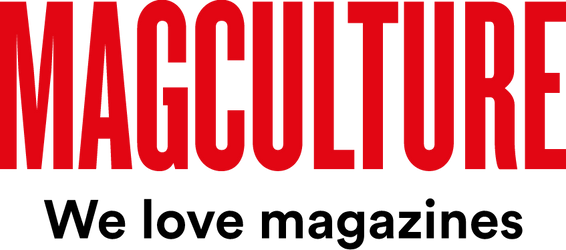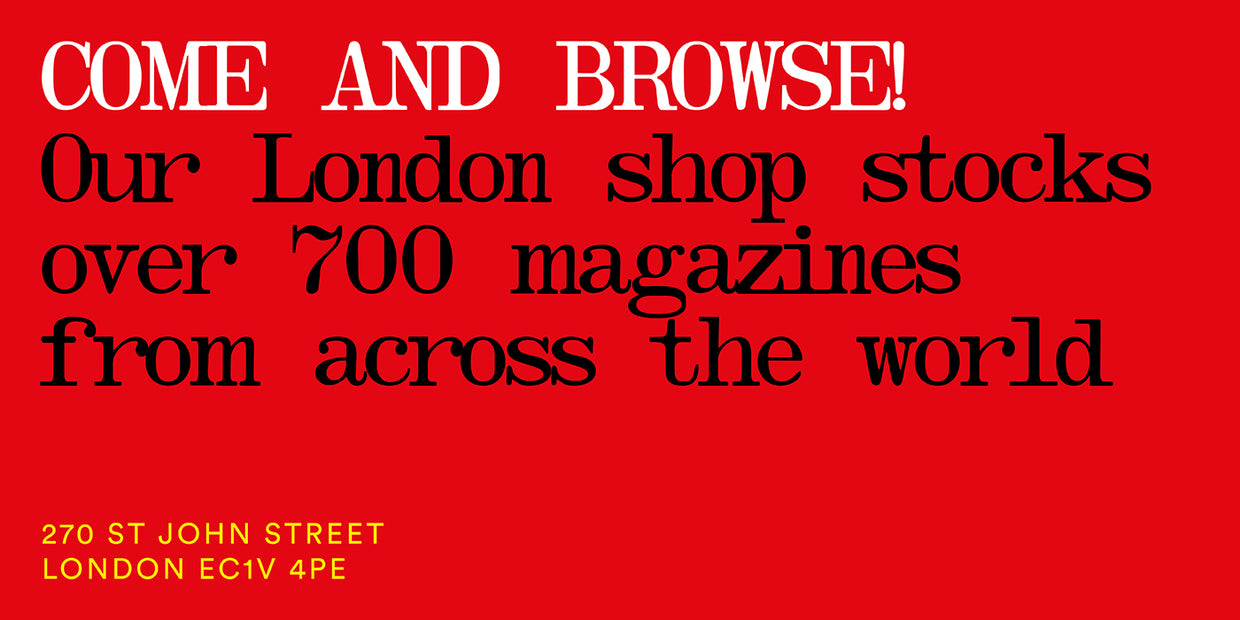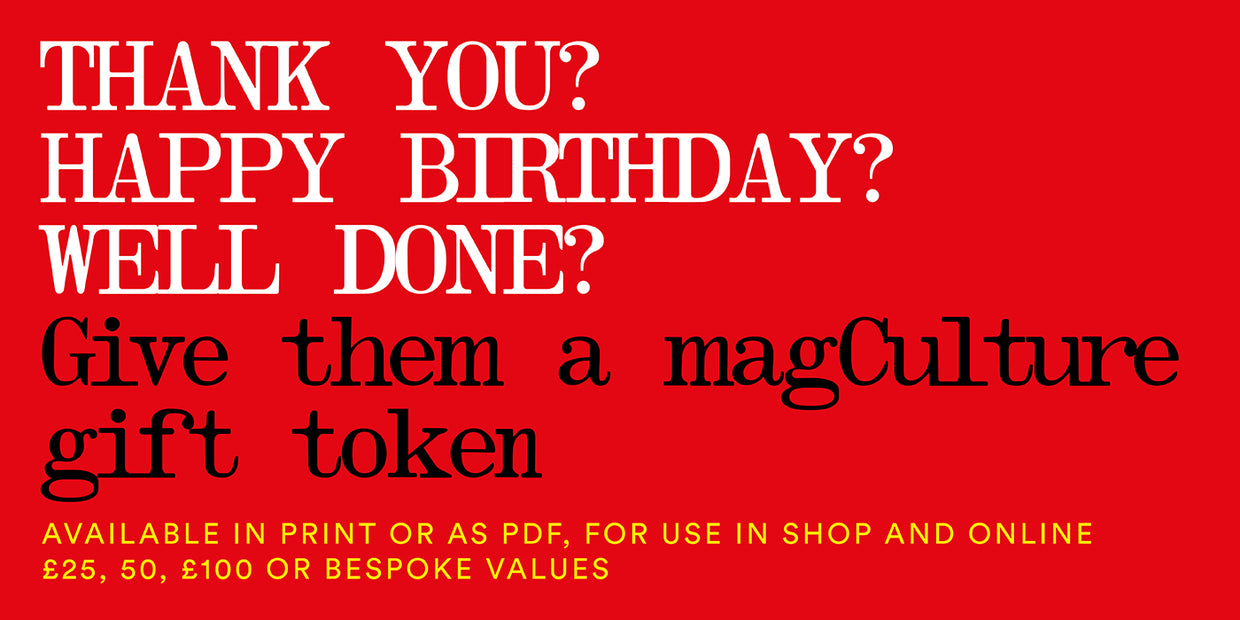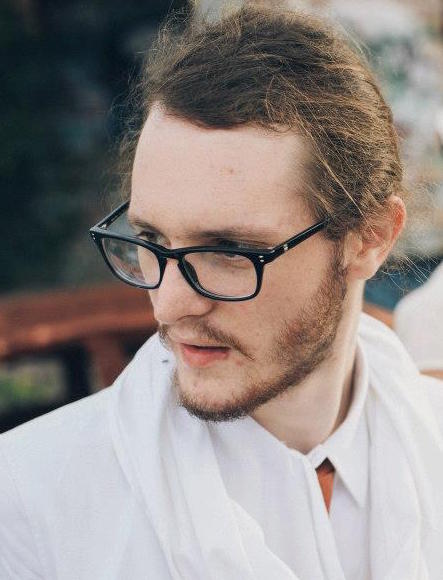
At Work With: Nick Watts, Future Perfect

Australian magazine Future Perfect was launched last year to satisfy the founders’ belief there was an uaidence for serious, longform writing in print. The second issue has just been published, featuring stories ranging from an overview of ISIS to a history of Beats headphones via excerpts from articles that first appeared in, among others, the New York Times, The New Yorker, The Monthly and Slate. It’s an eclectic magazine, one of a number of new launches focusing on serious subjects. We look at the week ahead with Nick Watts, founding editor and creative director.

Where are you today?
I’m at my desk at my house in Newtown, Sydney. Newtown is known as being this ‘edgy’ hipster part of Sydney, when in reality it is filled with rich people. My next-door neighbours are some legit Aussie hip hop stars who strike me as unnervingly wealthy considering all the mary jane they’re puffing out their windows 24/7. My desk is made of glass, and this is one of my life's regrets. If you want a fashionable, stark, minimalist desk to take your office to the next level, do not buy one of these hardened, unforgiving slabs.
You would be better off with a concrete altar than a desk made of glass. I have learnt not to trust things that are forged with the heat of a thousand suns. Why don’t I just sell it and buy a table made out of a beautiful tree? I think I am wrapped up in its cruelty, I can't give it up in the same way I couldn't give up a son I might one day have who turns out to be a terrible disappointment. All I can do is ward others off. I have quite a large computer display on my desk. I am legally blind, the result of a very rare neurological condition, and need things to be enormous or extremely close to my eyes to be seen properly. Next to it is a packet of pretzels, a painfully addictive choice. Because of this cursed glass desk I have to use a mouse pad, which right now is issue nine of Process Journal, a wonderful design publication from Melbourne.
This is where I do most of the magazine’s design work. I try to separate the editorial stages from the design stages, and take my little Macbook Air out with me to cafes when writing or editing written work. Right now, our third issue's content is very much still under construction. Over this week I'll decide on any layout changes to make from the last issue before material from writers and artists starts arriving.
What can you see from the window?
The window itself is more noteworthy than what lies beyond it. The owners of this house were obviously concerned for their safety at some point and had garish prison bars installed on every window and doorframe. The problem is, the bars are so sparsely spaced apart that a reasonably thin burglar could slip through these things easily. Beyond these pitiful security bars is a tiny courtyard, beyond that is the street. On the street is my wife’s car, it is filthy, I am sick of cursing the birds that are destroying its paint. Next to the car is a brand new street sign.
Only two days ago were this street sign and its friends installed, declaring our street a two hour parking zone instead of its previously untimed, unlimited parking condition. The street was furious, it truly is an outrage. Most households have more than one car and there are an exceptionally low number of permanent parking permits given out to residents. I thought, maybe, we can cut down all these street signs in the night. And when they are replaced, we cut down the replacements, and continue until judgement day. But an angle grinder would wake everyone up. I looked online for a high powered laser, but in order to get one powerful enough to cut through this much steel I would need about $200,000 and a more convincing reason to own it. I haven't given up.
Are you a morning or evening person?
I am so completely an evening person that my wife, brothers, sister, parents, housemates and friends just know not to talk to me before midday. I had a friend, a noted small business owner and great supporter of our magazine, once send all his friends a picture of me awake at 9am in a coffee shop he had dragged me too. It was a horrible experience, but I remember the coffee was good. I know that Kafka kept some trying hours, writing during the night, so I pretend to model myself from his example. Two days ago I descended the stairs at something like 11am, certainly at this time the sun isn't up, and was met with my housemate James jumping up and down, shouting and gesticulating wildly about the two hour parking situation. Even this traumatic event couldn't rouse me. I immediately set off to my local cafe in Alexandria and only once I had eaten and had a number of coffees did I call James to talk about the crisis. Forgive me for wild digressions, at this hour I am barely awake at all. I am listening to a tremendous release from a Sydney electronic musician Guerre, we interviewed him in issue two.
The night before our issue two was finalised kept the three of us awake until 3am. This was very normal for me. For Nick and Ryan it was traumatic. We all had planes to catch the next day. Me, New York City. Nick and Ryan, Hobart, Tasmania. We couldn’t figure out what copy to write for an ad inside the issue encouraging people to subscribe to Future Perfect. Last time, for issue one, we had all been drinking the night of our deadline, not necessarily heavily, but steadily, and wrote an ad that promoted spending money on gift subscriptions over money otherwise spent on CrossFit, the fitness sensation. When we saw this in the printed magazine we laughed of course, the joke was hilarious. But none of us could figure out why it was so funny. In the household budget fitness and magazines aren’t always mutually exclusive.
So at 3am, fading from wakefulness, we knew we needed a good ad in issue two. Something better than a stab at CrossFit. But the night took its toll. Nick and Ryan get up at 6am each morning and do yoga poses on the beach. The idea that they'd only get two and a bit hours of sleep was paralysing. Thankfully I was still alive and well. I often do the all night shift on Sydney's local music radio station, FBi Radio. I'm used to this. In the end, the ad was made. This time we had a go at our egregious Prime Minister and his unchecked corruption. A much better target than fitness classes. We did, though, leave a glaring typo on our subscriptions ad, misspelling prestigious as prestigious.

This morning it'd be Take, an Australian photojournalism magazine that I had been a Kickstarter supporter of. It is filled with mostly stunning images and very little writing.

The name implies Future Perfect an agenda for an ideal world. Describe that outlook.
We had named the magazine after a tense, future perfect, it's a particular kind of verb that indicates a completed action that is to occur in the future. I will have eaten a sandwich by midday. The ‘will have eaten’ there, that's the future perfect tense. It is less an agenda than a linguistic reference. I'm not sure we're striving towards a grand vision of a perfect future, these kinds of utopian visions always turn out badly.
When Sir Thomas More wrote his famous story ‘Utopia’, from where the word utopia came, it was his invention, he named his mysterious future civilisation very carefully. ‘Topia’ in Greek can mean place, the sound ‘eu’ at the front means well or good, in the same way it works for eulogy (good words), eugenics (good genes), etc..

But More was very crafty, the ‘u’ sound can also mean not or no, his invention both means ‘good place’ and ‘no place’ at the same time. He could see that our dazzling visions of a perfect future were hypnotising and great, but could never truly be real. He turned out to be nothing less than a prophet, all our history's utopian societies have crumbled and failed. I keep Sir Thomas More in mind often, our magazine does not pretend to be grand, it keeps its eyes on the people, telling stories that are important and intriguing and relevant. If we can address issues and ideas in focused, entertaining and revelatory pieces of writing, if we can make a magazine that our readers don't simply flick through and browse but really go away and read, it will be because we focus our efforts and craft on a few small things rather than too many big ones. We are always a little unsatisfied with the rapid-fire, 24/7 media cycle. We want to sit down and understand, and do so with a smile on our faces.

I really like the section featuring writing from other magazines and newspapers. Was it difficult to get permission for this from the publishers?
In Australia you’re allowed to quote a sizeable chuck of a piece of writing without getting permission from anyone. Which is great!
Our Slow Reading section begun quite some time ago. Before Future Perfect was a thing, we contributed to a quaint little blog over a few years, writing about music, politics, current events, that type of thing. I had a column called Slow Reading. It featured a few summaries and responses to particularly interesting pieces of long form journalism, encouraging people to read them by providing a little context around them. Ordinarily most don't read a 6,000 word article on the internet. But in the right circumstances, given the right context, we believe they will do so happily. When Future Perfect started to get off the ground, one of the team’s central ideas was an in-print section just like my column, except much expanded and written by all four of us instead of just by me. I wasn’t into the idea. I didn’t think a printed magazine was the ideal place for a summary or response to an article you had to go off and read on a computer or phone anyway.
But I gave in, wrote a few of them up, and our issue one designer Leon put together the pages. Still, I wasn’t a fan. I thought it was a bit kitsch, a misunderstanding of the relationship between printed and digital content. A few weeks later, our printed and bound copies of the magazine arrived. I was troubled to find that I actually sat down and read through the whole Slow Reading section from start to finish, something I didn’t do with anything else in issue one—too much time had been spent labouring over it, I was over of it. But because I really hadn't invested much into this section it still felt new and curious. And it became a huge success.
Every day you are bombarded with content while on the web, you can’t possibly follow up or retain even a quarter of it. The activity of filtering through Facebook or Twitter itself can be exhausting. Having this kind of aggregated content in print gives a literal and fixed context for your discovery of this material. If you read about an article on American racial politics in Future Perfect you’ll know where you read about it and you know where to go when you feel like following up on it—because it's over there in your bookshelf, not hidden somewhere in last week's browser history.
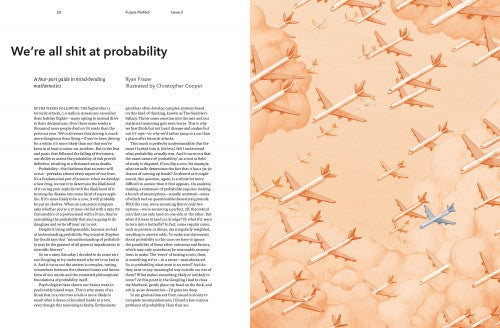
There seems to be mini-boom in self-published magazines in Australia. Why do you think this is?
I’m not sure. Melbourne is really where Australia's booming indie publishing scene is. There are lots of great magazines that come out of Melbourne. It's a city that fosters its art and design communities well. Publications like Frankie, Smith Journal, MADE, Process Journal and Offscreen have given Melbourne an international name for magazines. We're up here in Sydney like a bunch of disabled seagulls.

I have actually been asked this question a few times and each time I seem to give a worse answer. Australia describes itself, after a book from the 60s, as ‘the lucky country’, because we're blessed with a beautiful natural environment, plentiful natural resources. We're somewhat isolated from global conflict due to our ridiculous location, something that meant more in the 60s than it does today. In comparison to other developed nations we have low crime, we are reasonably well-educated, our economy is apparently in a good shape comparatively. It turns out that Donald Horne, the writer who coined the phrase ‘the lucky country’, had his coinage stolen and appropriated by a country of proud hacks. He wrote it describing us as only wealthy and prosperous by accident, that other nations developed new and innovative technologies to ensure their prosperity, but that Australia simply inherited its good fortune from a couple of lucky strikes. The British managed to invade a gigantic island that is tremendously rich in natural resources. And as country, we've been coasting on that good luck ever since. Very few Australians know the history of this term, ‘the lucky country’. We’ve turned it into a loveable catchphrase because it sounds congratulatory, when in fact it is damning! This gives you an idea of how inattentive we can be. I have a friend who describes us as ‘the mediocre country’ because so many of our best musicians end up moving to Berlin or the US. There are passionate, exceptional artists, thinkers, designers and writers here in Australia—there just aren't many, and they rarely bonafide celebrities. The ones who do succeed focus their energy from small but dedicated communities. One of these happens to be a community of Melbourne-based independent publishers and readers. Another is Sydney’s extraordinary community of electronic musicians, DJs and producers. Australia can do really specific and concerted things very well. It so happens that one of these is magazines.

You've learned about publishing by making your own magazine. What advice would you give someone planning their own launch?
This is tough. We started off Future Perfect so keen and so naive and I think that these extremely modest beginnings gave us a unique attitude and drive to succeed. If we'd known what we were getting ourselves into I don't know we would have started. As our profile grew we met some other magazine makers who gave us all kinds of advice. The importance of literally throwing a launch party, for example. It is galling at how much impact something as simple as a launch can have. As we were setting up our issue two launch Sydney was experiencing cyclonic weather, I was sure no one would turn up, they would all get hit by lightning on the way here. But the words ‘free beer’ do work. Before long a whole stack of people we knew and random readers who loved what we're doing turned up. We sold heaps of magazines, met some wonderful people, it was a huge injection of both confidence and money, and one of the best things we've done.
I would also say, be wary of printers. They are like a used car salesman crossed with a glass desk manufacturer. Crafty, deceitful, strangely overweight. We wanted to print our first issue here in Sydney, we looked at some overseas options but baulked at the shipping time and language difficulties. We got a very low quote from a shady but loveable seeming printer here. He gave us a few warning signs: he'd never let us meet him in his office, we could only meet in a strange cafe run by tattooed meth fiends (we only found this out later) and he demanded we pay in cash, in a briefcase. His business card was awful. But, he had a uncle-like charm, we said what the hell, let's do it. The date came when we were told the magazines were ready. Called this rotund printer on the phone, there had been a delay mysterious in nature, they'll be ready next week. I lost it, demanded they be ready immediately, we'd advertised a launch date, I did not want to extend it. He arranged to give us 10% of our print run the next day. The next day we drove to the address he gave us in Marrickville. I knew this street. There are no offices on this street. A van drove past, out stepped our printer. ‘Where are we meeting?’ I asked. ‘Right here!’ he beamed. He had picked a quiet street corner to offload the magazines from his van to our car. Even though we were new to this publishing game, this seemed highly irregular. At the end of the ordeal we were all so relieved that we actually received our magazines to be too cranky.
For issue two, we were recommended a printer and fulfilment centre based in Berlin by fellow Australian magazine maker Kai Brach. These Germans turned out to be consummate professionals, they gave us an amazing quote, far lower than any we could get here, and we went with them. We're not quite the novices we were when we did our first issue, but we're all still a little simple minded, and the sheer knowledge and expertise of these guys set us at ease. We could also now print on 100% recycled paper, something both great and necessary. I would advise any keen newcomers to get talking to your printer from day one. Find one you trust, one that will be attentive and direct. If while talking you feel like he will eat you and your children, even if you do not have any children, that is a warning sign. We ignored them so you don't have to.
What are you most looking forward to this week?
I’m going to a dinner party with some friends to play a game called Cards Against Humanity. If you’re unfamiliar with the game, it works like this: everyone gets ten white cards to start, on these white cards are random words, stuff like ‘Barack Obama’, ‘fear itself’, ‘the glass ceiling’, and so on. One person picks up a black card and reads out the scenario. ‘When I left Mexico, I smuggled _____ over the boarder.’ You pick a white card that would make this scenario as amusing as possible. The obvious choice is some kind of illicit drug, but bizarrely matched cards are the best. I think the last time I played ‘feminism’.
What are you least looking forward to this week?
So I’m pretty worried about this dinner party… there’ll be a few people there I don’t know as well, and this game really encourages you to delve into the darkest moments of history for comedic gold. This isn’t helped by the fact that most of Cards Against Humanity's white cards read things like ‘the Holocaust’, ‘smallpox blankets’ and ‘chunks of dead prostitutes"’. I don't know if these people will speak to me ever again.
What are you doing after this chat?
Future Perfect’s third issue is underway, there is much to do. I have to coordinate some illustrations of various bikie gang insignia, talk to a few writers about their articles. I want to interview an English writer about her recent book on falconry. But I want to go and see a hawk or falcon before I do. Would you believe that falconry is completely illegal in Australia? Very disappointing. Sydney's Taronga Zoo promises to have many types of birds of prey. Hopefully they will give me a glove and let me hold one. So I may go to the zoo, if it stops raining.
